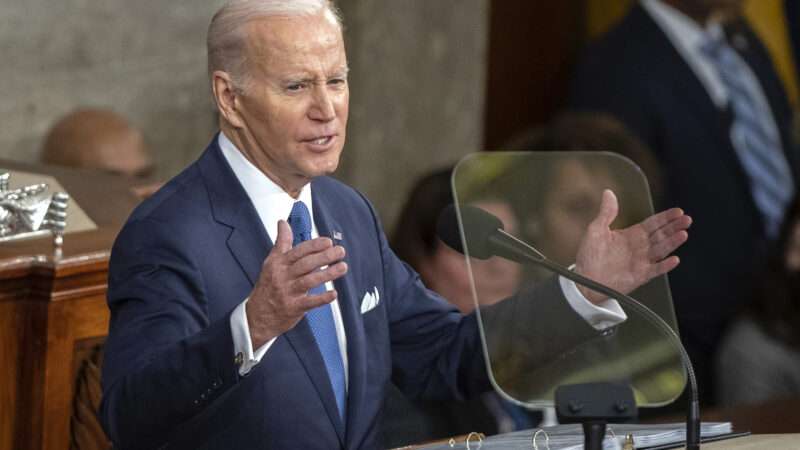
"I want to make it clear," President Joe Biden said two weeks ago as he teased his forthcoming budget proposal. "I'm going to raise some taxes."
That's one promise Biden won't be accused of breaking.
The president's annual budget proposal, set to be officially unveiled later today, will include a host of tax increases aimed at wealthier Americans and businesses—which pass those taxes on to workers and consumers. The pièce de résistance, according to a New York Times preview of the president's plans, will be a new tax on money that doesn't exist in the form of a levy on unrealized gains sitting in the investment accounts of households worth more than $100 million.
Biden's budget will also include quadrupling the new tax on stock buybacks implemented just months ago.
And it will include plans to hike the payroll taxes that pay for Medicare to shore up one of the entitlement program's critical trust funds, which is on pace to hit insolvency before the end of the decade. On Tuesday, White House Press Secretary Karine Jean-Pierre told reporters that the budget will "increase the Medicare tax rate on income above $400,000." That threshold is politically significant since Biden has promised not to raise taxes on Americans earning less than that amount annually.
As a practical matter, the president's budget is only as serious as its chances of getting approved by Congress. Those chances are slim at best, given Republican control of the House and the GOP's likely opposition to Biden's planned tax hikes.
But these proposals still matter because they provide the clearest glimpse into Biden's sense of the government's most critical issues. Once you cut through all the political chuff and buster, making a budget is nothing more than setting priorities.
In that regard, one of the main takeaways from Biden's budget proposal is that deficit politics might return from the dead. The White House is framing Biden's tax proposals as an attempt to curb runaway deficits—the increased revenue will help reduce deficits by a cumulative $3 trillion over the next 10 years, according to the Times' preview of Biden's plans—and ensure the continued solvency of Medicare, the federal government's old-age health care program.
In short, Biden's budget acknowledges that the government can't keep borrowing as recklessly as it has for the past few years, and should try to pay for the things it spends money on.
That's a welcome development but one that might ignore the actual problem: the spending itself. Indeed, the federal government doesn't have a revenue problem at all. Federal tax collections hit an all-time high of $4.9 trillion last year. As a share of the overall size of the economy—a measurement not affected by inflation—tax collections hit 19.6 percent last year. That's the highest level since 2000, the fourth-highest total since World War II, and well above the average post-war rate of about 17 percent.
The problem, of course, is that spending continues to outpace revenue by a wide margin. The Congressional Budget Office projects that under current law, the government will collect about 18 percent of GDP in tax revenue over the next 10 years but will spend a whopping 24 percent—a recipe for large and growing deficits that will slow economic growth and add to the already dangerous amount of debt the country is carrying.
Biden's plan to raise taxes might help reduce that gap, but the costs of those tax increases will be felt by every American who earns a paycheck and tries to save for retirement.
And even before the details of the tax proposals are fully public, there are worrying signs. One part of the proposal to shore up Medicare will reportedly rely on shifting revenue from the Net Investment Income Tax (NIIT)—a 3.8 percent surtax on high earners imposed as part of the Affordable Care Act—into Medicare's Hospital Insurance Trust Fund. That might help keep that trust fund solvent for longer, but it will reduce tax revenue for Congress to spend on other priorities.
"That would strengthen Medicare on paper without truly improving its financing," warns Maya MacGuineas, president of the Committee for a Responsible Federal Budget, a nonprofit that advocates for lower deficits. "Absent offsetting measures, this part of their plan simply robs Peter to pay Paul and, in the process, would worsen the budget outlook outside of the trust fund."
Those are the types of difficult decisions that the government will face as entitlements drive deficits higher, and it becomes more evident that there's not enough money to go around.
To some extent, Biden deserves credit for his willingness to admit that Americans are going to have to pay higher taxes if they want to continue having a government that spends over $6 trillion—and that is on pace to spend over $9 trillion annually by 2033, according to the CBO's estimates.
But paying for all that government isn't as easy as saying, "I'm going to raise some taxes." The hard part is still to come.
The post Biden's Budget Will Raise Taxes Without Addressing the Federal Government's Spending Problem appeared first on Reason.com.







